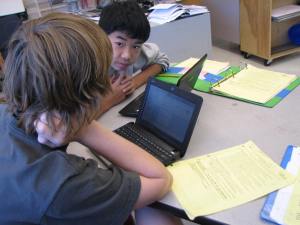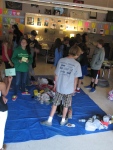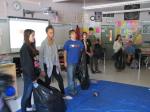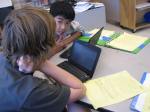Plastic Trash Issue and Density
November 25, 2012 at 4:27 PM Sue Boudreau 5 comments
We’ve spent the first quarter with very playful physics labs and very little big picture, heavy-duty ‘issues’, purposely. To build community and trust and reduce the fear factor inherent in physical science.
I started the density unit with the plastics problem in the oceans because what floats is what’s causing the huge problem on beaches and for the marine food chain. It’s a change of pace that has taken a couple of years to hit the right note with. Last year, for the record, we were overwhelmed with kids bringing in trash for sorting. The whole classroom – stinky and buried!
1. Socrates Cafe class discussion “What do you think about the state of the oceans?” to expose/re-activate their prior knowledge and feelings about it. Love this format because it’s so friendly and so interesting for me too. See blog post here for more deets. Fun to find out they learned quite a bit from their Take Action Projects last year – the plastic trash problem was studied by many of them because it’s so visibly tragic for animals, and because they could do trash pick ups as their direct action.
2. Video clip “The Synthetic Sea” from Algalita.org + q. sheet.1. Plastics in our Lives
3. Plastic trash sort: This year, me, Robert (student teacher) and Karen (my next door colleague) collected trash for a week and we raided the recycle bins at school. Dumped it all on a tarp, then had kids help sort it first by bags, bottles, wrappers etc., then by plastic resin type. Fun and quick. See the gallery for pics. The student sheet is in “1. Plastics in our Lives” link above.
- Teacher-trash in the middle of a tarp (soooo much easier clean up between classes. Just sayin.)
- Kids sort trash into bottles, bags, wrappers etc.
- Desks arranged so the teacher can circulate behind students and see their screens more easily. Helps trouble shoot more quickly and easier to see off task browsing.
- Pairs of students research their selected part of the plastic life cycle using Netbooks. The Google Docs intro is TOMORROW, so they get research done before fooling around with pics and formats.
4. Collaborative Google Doc presentation on the Life Cycle of Plastic. See gallery pics and here’s the student sheet for this: 2. Life Cycle of Plastic
I’m going to post separately on the grrrr experience of using Google Docs for the first time. Worth it. In the end. But with tips to maybe make it a little more entertaining for you than it was for me.

Pairs of students research their selected part of the plastic life cycle using Netbooks. The Google Docs intro is TOMORROW, so they get research done before fooling around with pics and formats.
5. More formal density labs – how to measure volume, mass and density accurately and precisely. I’ll share these as we do them.
Entry filed under: Density, Energy Opportunities Project, Environmental Education, Physics Topics, TAP Curriculum. Tags: 8th grade science, lab sheets, lesson plans, physical science lab, plastic pollution, plastics.
5 Comments Add your own
Leave a comment
Trackback this post | Subscribe to the comments via RSS Feed






1. Kelly | July 18, 2014 at 10:23 AM
Kelly | July 18, 2014 at 10:23 AM
Hi,
My name is Kelly, I teach 7th grade earth science and I stumbled upon your website. Just curious if you had any lesson plans to share regarding your life of plastic, oceans and density project? Thank you
LikeLike
2. Sue Boudreau | July 19, 2014 at 6:21 PM
Sue Boudreau | July 19, 2014 at 6:21 PM
Hello Kelly, could you send me your e mail to sueboudreau2004@yahoo.com and then I’ll enclose what I have for you. Sue
LikeLike
3. Marissa Lovins | November 5, 2014 at 7:37 PM
Marissa Lovins | November 5, 2014 at 7:37 PM
I would love to start this project with my science enrichment class! Can you please send any related lesson plans to me as well? I would really appreciate it!
LikeLike
4. Shari Connor | August 28, 2016 at 3:45 PM
Shari Connor | August 28, 2016 at 3:45 PM
Hi. My name is Shari and I love this idea. Would love your outline if you don’t mind sharing. Such a great idea on how to teach these topics.
LikeLike
5. Sue Boudreau | August 31, 2016 at 9:55 AM
Sue Boudreau | August 31, 2016 at 9:55 AM
Here’s the link to the dropbox folders with the lesson plans and resources. I’m happy you are interested in this, it’s such a huge problem and one that kids can get their hands around.
LikeLike